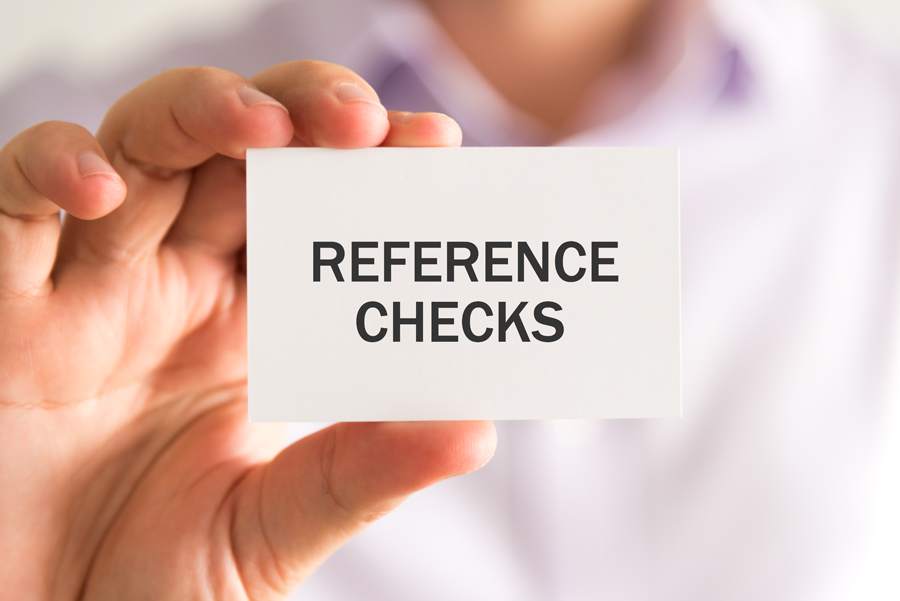
The National Association of Background Screeners (NABS) surveyed many employers in 2018 and found that 95 percent of employers used one or more types of employment background screening. Furthermore, the report showed that while most respondents conducted background checks during the recruitment process steps, others did so throughout the employment lifecycle.
Reasons to Conduct
Background checks, references checks, or both are appropriate means of screening prospective new employees for many reasons. The top reasons include the following:
Safety
Checking background and references is important to help the employer avoid various types of legal liability. This includes harm to:
- Other employees by sexual harassment or workplace violence.
- The organization's customers by, for example, sexual assault on business premises.
- The public by negligent driving.
- The employer's business through financial loss or image and reputational issues.
A thorough criminal records check on job applicants is imperative in defending legal claims, like the negligent hiring process. It is often strong evidence that the employer took due care to hire new hires with a multilevel jurisdictional criminal records search.
Maximize Productivity
The saying goes, "hire the best and reject the rest.". The past performance is usually an indication of their professional skills, productivity, job abilities, and communication skills with others. By checking references, you can tell whether a person is a valid high flyer.
Data Verification
The applicant's educational background, experience, employment history, and tenure can provide insight into their qualifications, integrity, and motivation. Employers have found more lies since 2005, according to a 2018 HireRight report. More than 80% of employers found misrepresentations in resumes as well as applications during the screening process.
The Legality of Reference Checks
There is a popular misconception that asking for references for information beyond confirming the candidate actually worked for the company for the period of time they claim to have worked is illegal.
Many companies use "no reference" policies that prevent current employees from sharing anything but the barest information about current and past employees, which results in this misconception.
Federal laws do not prevent them from providing you with more information about candidates, just company policies aimed at reducing the risk of discrimination and/or defamation lawsuits.
There is a good reason for that. For many companies, these risks outweigh the benefit of providing a detailed reference for former employees. In 2017, the EEOC recovered $484 million for victims of discrimination at work.
There are some ways to gather information on a candidate whose previous employer strictly enforced "no reference" policies:
Ask for references from former employees of the company
You can usually find out as much as you want about your candidate from the former colleague of his or her reference former employer. Even though the person will be considered a personal reference, they will be able to tell you about the candidate's strengths and weaknesses.
Evaluate performance reviews
Similarly, if a candidate can produce a complete list of performance reviews, these documents can also be used as references. Ensure you review the documents critically, as an incomplete collection of performance reviews can indicate that the candidate purposefully omitted important information. Conducting background checks presents a variety of legal challenges to human resource professionals.
Background Check Laws
Conducting background checks presents a variety of legal challenges to human resource professionals.
FEDERAL LAW
Background investigations are governed by several federal laws explicitly or implicitly.
- Fair Credit Reporting Act (FCRA): FCRA governs the use of consumer credit reports and investigative consumer reports, which apply when a third party conducts background checks on behalf of an employer. In the area of investigative consumer reporting, inquiries about job performance are common. In addition to verifications of public record sources commonly found on a basic consumer report, an investigative consumer report includes character references or personal observations. To request credit checks, a written disclosure and candidate notification is required under the FCRA.
- Fair and Accurate Credit Transactions Act (FACT Act, or FACTA): Among other things, the FACT Act, which amends the FCRA, governs the secure disposal of consumer credit information.
- Equal Employment Opportunity (EEO) Laws: Prospective employers should ensure that background investigations comply with all applicable EEO laws. A risk is that reliance on background investigations alone may result in adverse impact discrimination.
- Immigration Reform and Control Act of 1986 (IRCA): The IRCA prohibits employment discrimination based on national origin or citizenship for employers with four or more employees, except for undocumented immigrants. While the Form I-9 employment verification process is a result of IRCA. Although this verification occurs after hiring, it is important to note that national origin or citizenship cannot be used against an applicant if discovered before hire.
STATE LAW
There may be overlaps between some state laws and the relevant federal laws. Furthermore, states may need to meet additional requirements relating to:
- Obtaining a consumer credit report.
- Controlling illegal immigration.
- Safeguarding information.
- Retaining records.
- Checking criminal histories before an offer of employment.
Employers need to make sure that they comply with state laws in the states where they employ workers.
Reference Checks Legal Issues
The following are some of the most common legal issues associated with reference checks and avoid them.
Discrimination in Reference Checking
Work is not a place for prejudice or discrimination, but these factors affect how people are recommended daily. To mitigate the possibility of biased or discriminatory references being accepted as legitimate references, it is essential that bias or discriminatory leanings are identified and that enough references are contacted to minimize the chance this could happen. A similar issue concerns the protection of "protected class" information uncovered during reference checks. Candidate information within the following categories is considered a "protected class" and cannot affect a hiring decision:
- Race
- Height and Weight
- Financial Information
- Unemployed Status
- Background Checks
- Religious Affiliation or Beliefs
- Citizenship
- Marital Status, Number of Children
- Gender
- Disability
- Medical Questions and Examinations
Avoiding this issue:
- NEVER ask a candidate’s references for protected class information regarding the candidate.
- ALWAYS be vigilant for bias or discrimination in references, especially those related to protected class information.
- ALWAYS try to get enough references to establish a candidate performance trend and act as a buffer against biased and discriminatory references.
- NEVER use protected class information as part of your hiring decision.
Disorganized or Unstructured Reference Checking
If your reference checking process is disorganized or unstructured, the references your candidates provide are not being engaged in an organized, standardized manner. You may also miss crucial candidate information if the reference checking process does not follow a logical order. Ignoring some candidate information may lead you to overlook the right candidate, while missing other information may cause you to think a terrible or even dangerous candidate is qualified for the position. References checked in a non-standardized way increase the likelihood of a final decision on a candidate being influenced by personal bias or discriminatory bias.
Avoiding this issue:
ALWAYS have a standardized reference check process that ensures all candidate references are asked the same questions and that their answers are recorded fully and accurately.
Negligent Hiring & Negligent Referrals
The problem of negligent hiring and negligent referrals is the opposite of the legality question related to references. In negligent hiring, a candidate is hired when details that could have disqualified him/her were not discovered or considered. If, for example, you hire someone without checking and vetting their references and/or without performing a background check, you have engaged in negligent hiring. Alternatively, an employer who negligently refers a candidate is one who fails to disclose information that would disqualify them for the job. In this case, the former employer would have failed to disclose that the applicant was fired for sexual harassment or violence in the workplace.
Avoiding this issue:
- ALWAYS ask references about a candidate’s workplace behavior, ethics, and the reason that they left the company.
- ALWAYS be vigilant for evidence that a reference is not telling the whole truth about a candidate.
- NEVER make a hire without checking and vetting references and performing a background check.
Avoid Reference Bias by Collecting Enough Data
Now that you know you need to check references and you know you should have at least a fair amount of feedback, how do you gather enough to account for bias in hiring?
The average recruiter spends 72 minutes chasing down references per candidate. But what are the results? Only two references respond. Perhaps that is why recruiters often avoid calling references. As a result, when using a system like Checkster to automate reference checking, it takes recruiters only 2 minutes per candidate, collecting 6 references in less than 48 hours. By accumulating so many respects, you can quickly avoid individual bias and gather collective intelligence -- significant data points from many references that lead to higher quality information on the candidate.
Standardize Reference Questions for Compliance
Who is to say that all recruiters in your department or company will follow this detailed list of dos and don'ts? Standardizing your reference questions will ensure you avoid using protected class information or allowing other biases, for that matter, while remaining legally compliant.
With a reference checking tool, you can customize and standardize the reference questions so that the information gathering is tailored to the job or department but structured and consistent.
Legal Reference Questions
References can provide a lot of information about your candidate if your request is not restricted by state legislation or a protected class.
To save yourself some time before you begin digging through references, ask the following serious question first: How does your company handle professional references?
When you understand what information a reference can provide you with from the beginning, you can tailor your interview process to fit this constraint and avoid the frustration of hitting a brick wall over and over again.
You can ask specific questions like these to find out important information about a reference's aptitude, performance, and fit once you know what questions they can answer.
- Can you verify the details of the candidate's employment (start and end dates, salary, position, etc.)?
- Why did the candidate leave the company?
- What is your professional relationship with the candidate and how did it begin?
- How long have you worked with the candidate or how long did you work with them?
- What were the candidate’s responsibilities while working in the role(s) at your company?
- In your experience, what are the candidate’s professional strengths and how were they an asset for their team and your company?
- In your experience, do you think that the candidate has any shortcomings at work or any areas that should be improved?
- How would you rate the candidate’s overall job performance from poor to fantastic? What, specifically, has led you to rate them in this way?
- Is the candidate eligible to be re-hired?
- Do you believe that the candidate is qualified for the job they are applying for at my company? What, specifically, qualifies or disqualifies them?
- Were there any workplace conduct or ethical incidents caused by this candidate when they worked for your company?
Trends
The trends associated with background screening and reference checks can be attributed to a variety of developments and trends within society.
AUTOMATION: In addition to phone interviews, screening firms and employers are using technology to improve the accuracy of conducting reference checks. Reference sources can respond quickly and confidentially to requests for information through some screening firms' online solutions. Others believe that online reference checking does not enable hiring managers or screening professionals to ask probing questions in an interactive manner. Despite this, requesters can always reference call and ask follow-up questions about candidates after reading the initial report.
SCREENING OF CONTINGENT WORKFORCE: The Bureau of Labor Statistics reports that nearly four out of five employers use some form of non-traditional staffing such as hiring freelancers, temporary workers, or independent contractors on an as-needed basis. As with regular employees, these workers are subject to the same workplace liability issues, so more employers are screening them to protect themselves.
GLOBALIZATION: Companies increasingly look to foreign job markets as they seek to expand their workforce. Today, job applicants are often educated and trained abroad and have worked in several countries. Employers realize how complex and essential job candidate screening has become to the health of an organization. Global employers must ensure that local laws regarding background checks are followed.
Conclusion
Making sure your reference checks fall on the right side of the law can be tricky — especially when it comes to understanding consent. Conduct and obtain references checks in accordance with federal, state, and local laws as well as company policy.
About Harrison Barnes
No legal recruiter in the United States has placed more attorneys at top law firms across every practice area than Harrison Barnes. His unmatched expertise, industry connections, and proven placement strategies have made him the most influential legal career advisor for attorneys seeking success in Big Law, elite boutiques, mid-sized firms, small firms, firms in the largest and smallest markets, and in over 350 separate practice areas.
A Reach Unlike Any Other Legal Recruiter
Most legal recruiters focus only on placing attorneys in large markets or specific practice areas, but Harrison places attorneys at all levels, in all practice areas, and in all locations-from the most prestigious firms in New York, Los Angeles, and Washington, D.C., to small and mid-sized firms in rural markets. Every week, he successfully places attorneys not only in high-demand practice areas like corporate and litigation but also in niche and less commonly recruited areas such as:
- Immigration Law
- Workers Compensation
- Insurance
- Family Law
- Trust and Estate
- Municipal law
- And many more...
This breadth of placements is unheard of in the legal recruiting industry and is a testament to his extraordinary ability to connect attorneys with the right firms, regardless of market size or practice area.
Proven Success at All Levels
With over 25 years of experience, Harrison has successfully placed attorneys at over 1,000 law firms, including:
- Top Am Law 100 firms such including Sullivan and Cromwell, and almost every AmLaw 100 and AmLaw 200 law firm.
- Elite boutique firms with specialized practices
- Mid-sized firms looking to expand their practice areas
- Growing firms in small and rural markets
He has also placed hundreds of law firm partners and has worked on firm and practice area mergers, helping law firms strategically grow their teams.
Unmatched Commitment to Attorney Success - The Story of BCG Attorney Search
Harrison Barnes is not just the most effective legal recruiter in the country, he is also the founder of BCG Attorney Search, a recruiting powerhouse that has helped thousands of attorneys transform their careers. His vision for BCG goes beyond just job placement; it is built on a mission to provide attorneys with opportunities they would never have access to otherwise. Unlike traditional recruiting firms, BCG Attorney Search operates as a career partner, not just a placement service. The firm's unparalleled resources, including a team of over 150 employees, enable it to offer customized job searches, direct outreach to firms, and market intelligence that no other legal recruiting service provides. Attorneys working with Harrison and BCG gain access to hidden opportunities, real-time insights on firm hiring trends, and guidance from a team that truly understands the legal market. You can read more about how BCG Attorney Search revolutionizes legal recruiting here: The Story of BCG Attorney Search and What We Do for You.
The Most Trusted Career Advisor for Attorneys
Harrison's legal career insights are the most widely followed in the profession.
- His articles on BCG Search alone are read by over 150,000 attorneys per month, making his guidance the most sought-after in the legal field. Read his latest insights here.
- He has conducted hundreds of hours of career development webinars, available here: Harrison Barnes Webinar Replays.
- His placement success is unmatched-see examples here: Harrison Barnes' Attorney Placements.
- He has created numerous comprehensive career development courses, including BigLaw Breakthrough, designed to help attorneys land positions at elite law firms.
Submit Your Resume to Work with Harrison Barnes
If you are serious about advancing your legal career and want access to the most sought-after law firm opportunities, Harrison Barnes is the most powerful recruiter to have on your side.
Submit your resume today to start working with him: Submit Resume Here
With an unmatched track record of success, a vast team of over 150 dedicated employees, and a reach into every market and practice area, Harrison Barnes is the recruiter who makes career transformations happen and has the talent and resources behind him to make this happen.
A Relentless Commitment to Attorney Success
Unlike most recruiters who work with only a narrow subset of attorneys, Harrison Barnes works with lawyers at all stages of their careers, from junior associates to senior partners, in every practice area imaginable. His placements are not limited to only those with "elite" credentials-he has helped thousands of attorneys, including those who thought it was impossible to move firms, find their next great opportunity.
Harrison's work is backed by a team of over 150 professionals who work around the clock to uncover hidden job opportunities at law firms across the country. His team:
- Finds and creates job openings that aren't publicly listed, giving attorneys access to exclusive opportunities.
- Works closely with candidates to ensure their resumes and applications stand out.
- Provides ongoing guidance and career coaching to help attorneys navigate interviews, negotiations, and transitions successfully.
This level of dedicated support is unmatched in the legal recruiting industry.
A Legal Recruiter Who Changes Lives
Harrison believes that every attorney-no matter their background, law school, or previous experience-has the potential to find success in the right law firm environment. Many attorneys come to him feeling stuck in their careers, underpaid, or unsure of their next steps. Through his unique ability to identify the right opportunities, he helps attorneys transform their careers in ways they never thought possible.
He has worked with:
- Attorneys making below-market salaries who went on to double or triple their earnings at new firms.
- Senior attorneys who believed they were "too experienced" to make a move and found better roles with firms eager for their expertise.
- Attorneys in small or remote markets who assumed they had no options-only to be placed at strong firms they never knew existed.
- Partners looking for a better platform or more autonomy who successfully transitioned to firms where they could grow their practice.
For attorneys who think their options are limited, Harrison Barnes has proven time and time again that opportunities exist-often in places they never expected.
Submit Your Resume Today - Start Your Career Transformation
If you want to explore new career opportunities, Harrison Barnes and BCG Attorney Search are your best resources. Whether you are looking for a BigLaw position, a boutique firm, or a move to a better work environment, Harrison's expertise will help you take control of your future.
Submit Your Resume Here to get started with Harrison Barnes today.
Harrison's reach, experience, and proven results make him the best legal recruiter in the industry. Don't settle for an average recruiter-work with the one who has changed the careers of thousands of attorneys and can do the same for you.
About BCG Attorney Search
BCG Attorney Search matches attorneys and law firms with unparalleled expertise and drive, while achieving results. Known globally for its success in locating and placing attorneys in law firms of all sizes, BCG Attorney Search has placed thousands of attorneys in law firms in thousands of different law firms around the country. Unlike other legal placement firms, BCG Attorney Search brings massive resources of over 150 employees to its placement efforts locating positions and opportunities its competitors simply cannot. Every legal recruiter at BCG Attorney Search is a former successful attorney who attended a top law school, worked in top law firms and brought massive drive and commitment to their work. BCG Attorney Search legal recruiters take your legal career seriously and understand attorneys. For more information, please visit www.BCGSearch.com.
Harrison Barnes does a weekly free webinar with live Q&A for attorneys and law students each Wednesday at 10:00 am PST. You can attend anonymously and ask questions about your career, this article, or any other legal career-related topics. You can sign up for the weekly webinar here: Register on Zoom
Harrison also does a weekly free webinar with live Q&A for law firms, companies, and others who hire attorneys each Wednesday at 10:00 am PST. You can sign up for the weekly webinar here: Register on Zoom
You can browse a list of past webinars here: Webinar Replays
You can also listen to Harrison Barnes Podcasts here: Attorney Career Advice Podcasts
You can also read Harrison Barnes' articles and books here: Harrison's Perspectives
Harrison Barnes is the legal profession's mentor and may be the only person in your legal career who will tell you why you are not reaching your full potential and what you really need to do to grow as an attorney--regardless of how much it hurts. If you prefer truth to stagnation, growth to comfort, and actionable ideas instead of fluffy concepts, you and Harrison will get along just fine. If, however, you want to stay where you are, talk about your past successes, and feel comfortable, Harrison is not for you.
Truly great mentors are like parents, doctors, therapists, spiritual figures, and others because in order to help you they need to expose you to pain and expose your weaknesses. But suppose you act on the advice and pain created by a mentor. In that case, you will become better: a better attorney, better employees, a better boss, know where you are going, and appreciate where you have been--you will hopefully also become a happier and better person. As you learn from Harrison, he hopes he will become your mentor.
To read more career and life advice articles visit Harrison's personal blog.






